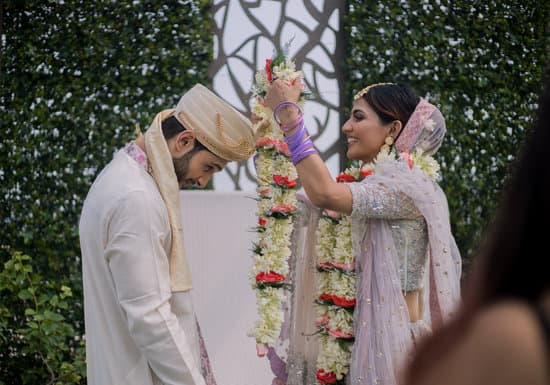Planning a wedding can be an exciting yet overwhelming experience, especially when it comes to deciding on the decor and floral arrangements. One of the most common questions that often arises during the planning process is: “How many flowers do I need for my wedding?” The role of flowers in a wedding goes beyond mere decoration; they have the power to enhance the overall ambiance, reflect the couple’s personality, and add a touch of romance to the celebration.
When it comes to determining the number of flowers needed for your wedding, there are several factors to consider. The venue type, wedding theme, color scheme, and personal preferences all play a significant role in this decision-making process. From the bridal bouquet to ceremony decor, and reception centerpieces, each aspect requires careful consideration to create a cohesive floral design that complements the overall look and feel of your special day.
In this article, we will explore how to determine the quantity and placement of flowers for your wedding, including choosing the perfect bouquet size and style, coordinating with the groom’s boutonniere, creating a cohesive floral design for both the ceremony and reception space, as well as managing the cost by budgeting effectively.
Whether you’re envisioning an elaborate floral extravaganza or a simple yet elegant arrangement, understanding these key aspects will help you make informed decisions when it comes to planning your dream wedding flowers.
Setting the Scene
When it comes to deciding on the number of flowers needed for your wedding, there are several factors to take into consideration. The venue type, wedding theme, and color scheme all play a role in determining how many flowers you will need to achieve the desired look for your special day.
First and foremost, consider the venue type. If you are having an outdoor ceremony, you may need more flowers to create a focal point and add pops of color to the natural surroundings. On the other hand, if your wedding is in a grand ballroom, fewer flowers may be needed as the space itself already provides a stunning backdrop.
Next, think about your wedding theme and color scheme. If you have a specific theme or style in mind, such as bohemian or modern chic, this will impact the types of flowers you choose and how many you will need. Additionally, the color palette you have selected for your wedding will also influence how many flowers are necessary to bring that vision to life.
Furthermore, consider the size of your guest list and bridal party when deciding on the number of flowers needed. The larger your guest list and bridal party, the more flowers will be required for bouquets, boutonnieres, centerpieces, and other floral arrangements throughout your wedding day.
In summary, when determining how many flowers you need for your wedding, take into account factors such as venue type, wedding theme, color scheme, guest list size, and bridal party size. By carefully considering these elements, you can ensure that you have just the right amount of flowers to create a beautiful and cohesive floral design for your special day.
The Bridal Bouquet
When it comes to choosing the perfect bridal bouquet for your wedding, there are a few key factors to consider that will help you determine the size and style that best fits your vision for your big day.
Size Matters
One of the first things to think about when choosing your bridal bouquet is the size. The size of your bouquet should complement your overall look and stature, as well as the style of your gown. If you are on the petite side, a smaller bouquet may be more in proportion with your frame, whereas if you are taller or have a more dramatic gown, a larger bouquet may make more of a statement.
Style and Shape
In addition to size, the style and shape of your bouquet should also reflect your personal taste and wedding theme. Traditional round bouquets are classic and timeless, while cascading bouquets add a touch of drama and romance. You can also consider more modern styles such as hand-tied or composite bouquets, which offer a unique twist on traditional designs.
Color Palette
When choosing the flowers for your bridal bouquet, it’s important to consider how they will complement your overall color scheme. Whether you opt for monochromatic blooms or a mix of vibrant hues, the colors in your bouquet should tie in with the rest of your wedding décor for a cohesive look.
Ultimately, choosing the perfect bridal bouquet is about selecting something that not only looks beautiful but also feels right for you as you walk down the aisle. By considering factors such as size, style, shape, and color palette, you can create a stunning arrangement that perfectly complements your wedding day look.
The Groom’s Boutonniere
When it comes to planning your wedding, it’s essential to consider every detail, including the flowers. The groom’s boutonniere is an important part of the overall floral design and should be coordinated with the bridal bouquet and the overall aesthetic of the wedding. It’s crucial to ensure that the boutonniere complements the bride’s bouquet while also fitting in with the theme and color scheme of the wedding.
First and foremost, consider the size and style of the bridal bouquet. If the bride’s bouquet is large and elaborate, you may want to opt for a smaller, more understated boutonniere for the groom. Conversely, if the bridal bouquet is simple and classic, you can choose a more detailed boutonniere for the groom.
Consider coordinating the flowers in both bouquets. Whether it’s using similar types of flowers or matching colors, this can create a cohesive look between the bride and groom’s floral arrangements. Additionally, take into account any other accessories or details in both bouquets, such as ribbon or greenery, to ensure a harmonious overall look.
Lastly, think about how the boutonniere fits into the overall wedding theme and style. From traditional roses to modern succulents, there are endless options for creating a boutonniere that reflects your personal style as a couple and enhances the overall aesthetic of your special day.
Suggested HTML list:
- Consider size and style of bridal bouquet
- Coordinate flowers in both bouquets
- Fit boutonniere into overall wedding theme
Ceremony Decor
When it comes to deciding on the quantity and placement of flowers for the ceremony, there are several factors to consider. First and foremost, you’ll want to take into account the size and style of the venue.
A larger space may require more floral arrangements to make a significant impact, while a smaller space could be overwhelmed by too many flowers. Additionally, you’ll want to consider the overall wedding theme and color scheme to ensure that the floral decor complements the aesthetics of the ceremony.
The next step in determining the quantity and placement of flowers for the ceremony is to outline which specific areas will be adorned with floral arrangements. This may include the altar or ceremonial space, pew or chair decorations, as well as any other focal points within the venue. By strategically placing flowers in key areas, you can create a cohesive and visually impactful design that enhances the atmosphere of your wedding ceremony.
One essential aspect to keep in mind when calculating how many flowers you need for your wedding ceremony is your budget. The cost of flowers can vary significantly based on factors such as flower type, seasonality, and overall design complexity. Therefore, it’s crucial to work closely with your florist to determine a realistic budget for your ceremony decor and find ways to maximize impact without exceeding your financial parameters.
| Factors to Consider | Considerations |
|---|---|
| Venue Type | Impact of venue size on floral arrangements |
| Wedding Theme and Color Scheme | Complementing floral decor with overall aesthetics |
| Budgeting for Flowers | Working within financial parameters for optimal effect |
Reception Decor
When it comes to reception decor, the use of flowers can play a crucial role in creating a cohesive and visually appealing atmosphere for your wedding. The key is to consider the overall theme and style of your wedding, as well as the layout and design of the reception space itself.
By carefully planning the floral arrangements for the reception, you can ensure that they complement the rest of your wedding decor and create a stunning ambiance for you and your guests.
Consider the Reception Space
Before deciding on the quantity and types of flowers needed for the reception decor, it’s important to take into account the size and layout of the reception space. Larger venues may require more elaborate floral arrangements to fill the space and make a visual impact. Smaller venues might benefit from simpler, more understated floral designs to avoid overwhelming the space.
Personalize Your Floral Design
The reception decor should reflect your personal style as a couple, so don’t be afraid to get creative with your floral design. Consider incorporating unique elements such as oversized centerpieces, hanging installations, or flower walls to add a wow factor to your reception space. Additionally, work with your florist to incorporate specific flower varieties or colors that hold personal significance for you and your partner.
Coordinate With Other Decor Elements
To create a cohesive look for your reception decor, be sure to coordinate your floral arrangements with other design elements such as table linens, lighting, and overall color scheme. This will help tie everything together and create a harmonious visual experience for you and your guests. Whether you opt for lush and extravagant floral displays or prefer a more minimalist approach, ensuring that all aspects of your reception decor work together will result in a beautiful and unified look.
Additional Floral Needs
When it comes to planning a wedding, one of the most common questions that arises is, “How many flowers do I need for my wedding?” While a specific number may vary depending on your personal preferences and the size of your wedding, there are some key areas where flowers might be needed that you’ll want to consider.
One important area where flowers may be needed is for cake decorations. Whether you’re opting for a traditional tiered cake or a trendy dessert table, adding fresh blooms can elevate the overall look of your confection. Typically, you’ll want to work with your baker and florist to determine the quantity and type of flowers that will complement your cake design.
Another floral need to consider is corsages. Traditionally worn by mothers and grandmothers of the bride and groom, as well as other special female family members, corsages add a touch of elegance to their outfits. The quantity of corsages required will depend on your family size and who you would like to include in this tradition.
Lastly, don’t forget about boutonnieres for male members of the wedding party. These small floral arrangements are typically worn by the groom, groomsmen, fathers and grandfathers of the couple. Coordinating boutonnieres with other floral elements such as the bridal bouquet can create a cohesive look throughout your wedding.
Considering these additional floral needs will ensure that all aspects of your wedding are beautifully adorned with flowers, adding an elegant touch that ties everything together.
| Floral Need | Considerations |
|---|---|
| Cake Decorations | Work with baker and florist; determine quantity and type |
| Corsages | Worn by mothers, grandmothers, special female family members; quantity based on family size |
| Boutonnieres | Worn by male wedding party members; coordinate with other floral elements |
Budgeting for Flowers
In conclusion, determining how many flowers you need for your wedding is a crucial aspect of the planning process. Flowers play a significant role in enhancing the overall ambiance and aesthetic of your special day, so it’s essential to carefully consider your floral needs. Factors such as the venue type, wedding theme, color scheme, and personal preferences should all be taken into account when deciding on the quantity and placement of flowers for your ceremony and reception.
When it comes to budgeting for flowers, there are several tips to keep in mind. First, consider seasonal blooms or locally sourced flowers to potentially reduce costs while still achieving a stunning display. Additionally, working with a professional florist who can provide valuable insights and guidance based on your budget can be immensely helpful. For those looking to save on costs, opting for smaller bridal bouquets or simpler ceremony decor can also make a difference.
Ultimately, the key is to strike a balance between achieving your desired floral vision and staying within your budget. By carefully considering all aspects of your wedding that may require flowers and exploring cost-saving strategies, you can create a beautiful floral design that perfectly complements your special day without breaking the bank.
So as you plan for your big day, take the time to carefully assess how many flowers you need for your wedding and explore ways to manage the cost effectively.
Frequently Asked Questions
How Many Flowers Are Used for a Wedding?
The number of flowers used for a wedding can vary greatly depending on factors such as the size of the wedding, the floral arrangements chosen, and the personal preferences of the couple. It’s common to use flowers for bouquets, centerpieces, boutonnieres, and other decorations.
Is $5000 Enough for Wedding Flowers?
Whether $5000 is enough for wedding flowers depends on the specific needs and wants of the couple. This budget could be sufficient for a moderately sized wedding with beautiful floral arrangements, but it may not cover extensive floral decoration or premium flower choices.
Is $1,500 Enough for Wedding Flowers?
A budget of $1500 may be enough for wedding flowers if the couple prioritizes carefully and looks for cost-effective options. They may need to limit the number of floral arrangements or choose more affordable flower varieties to stay within this budget while still having lovely flowers at their wedding.

I have been involved in marriages for over 20 years helping couples and singles understand more about them.





